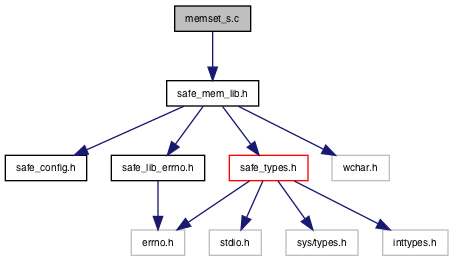memset_s.c File Reference
#include "safe_mem_lib.h" Include dependency graph for memset_s.c:
Include dependency graph for memset_s.c:Functions | |
| EXPORT errno_t | memset_s (void *dest, rsize_t dmax, int value, rsize_t n) |
| Sets the first n bytes starting at dest to the specified value, but maximal dmax bytes. More... | |
Function Documentation
◆ memset_s()
Sets the first n bytes starting at dest to the specified value, but maximal dmax bytes.
- Remarks
- SPECIFIED IN
- C11 standard (ISO/IEC 9899:2011): K.3.7.4.1 The memset_s function (p: 621-622) http://en.cppreference.com/w/c/string/byte/memset
- ISO/IEC JTC1 SC22 WG14 N1172, Programming languages, environments and system software interfaces, Extensions to the C Library, Part I: Bounds-checking interfaces
- Parameters
-
[out] dest pointer to memory that will be set to the value [in] dmax maximum number of bytes to be written [in] value byte value to be written [in] n number of bytes to be set
- Precondition
- dest shall not be a null pointer.
- dmax and n shall not be greater than RSIZE_MAX_MEM.
- value shall not be greater than 255.
- dmax may not be smaller than n.
- Without C11 dmax and n shall not be 0
- Note
- The behavior is undefined if the size of the character array pointed to by dest < count <= dmax; in other words, an erroneous value of dmax does not expose the impending buffer overflow.
- C11 uses RSIZE_MAX, not RSIZE_MAX_MEM.
- C11 returns 0 when n = ZERO.
- Returns
- If there is a runtime-constraints violation, and if dest is not a null pointer, and if dmax is not larger than RSIZE_MAX_MEM, then, before reporting the runtime-constraints violation, memset_s() copies dmax bytes to the destination.
- Return values
-
EOK when operation is successful ESNULLP when dest is NULL pointer (EINVAL with C11) ESZEROL when n = ZERO (unless C11) ESLEMAX when dmax/n > RSIZE_MAX_MEM or value > 255 ESNOSPC when dmax < n
- See also
- memset16_s(), memset32_s()
